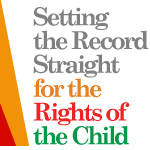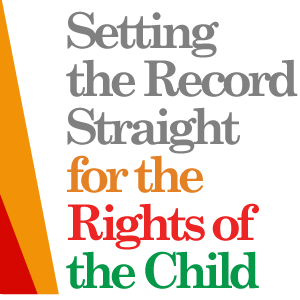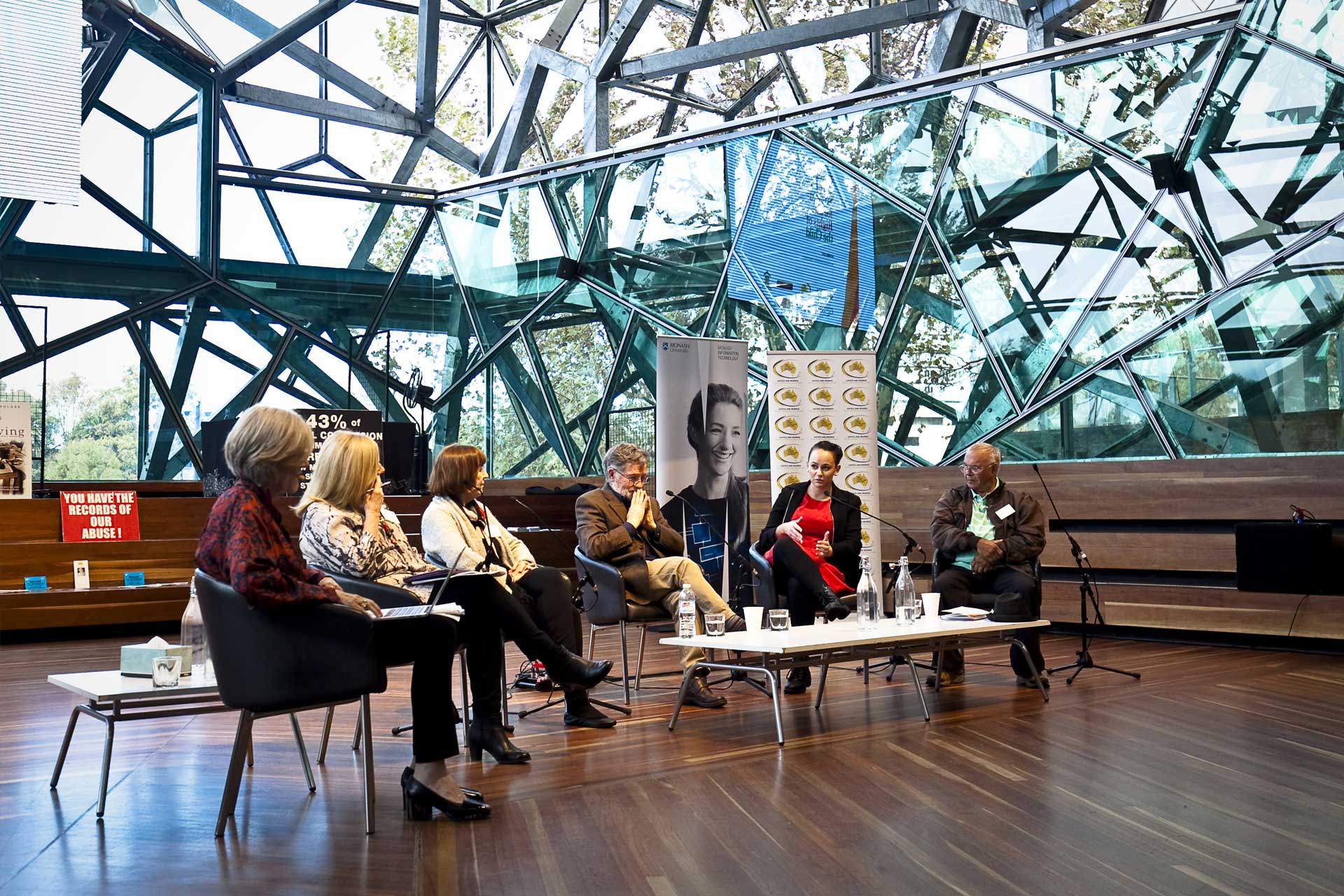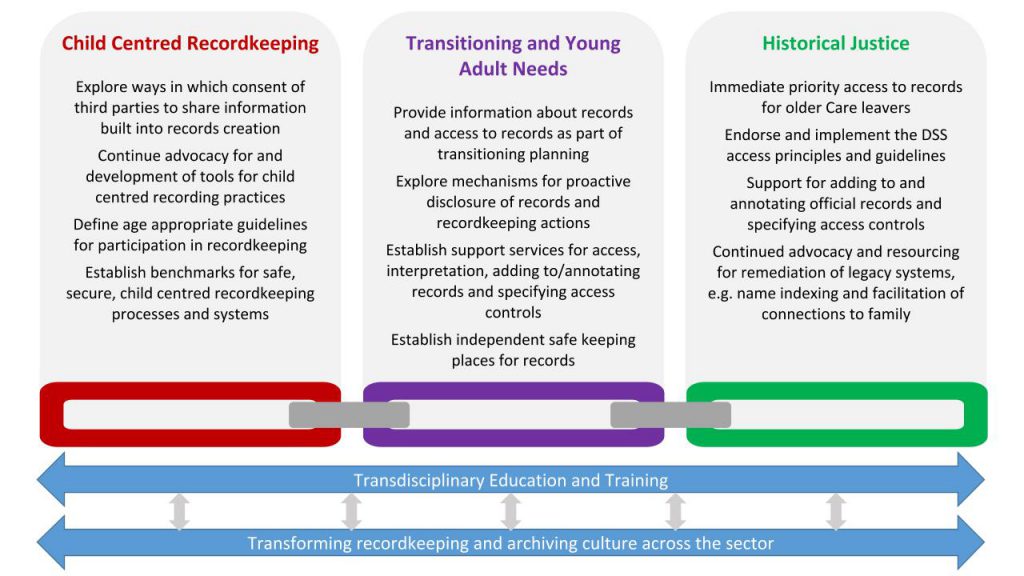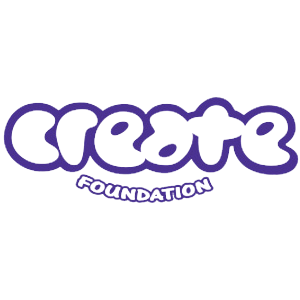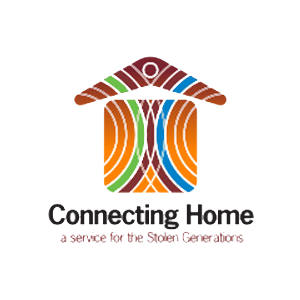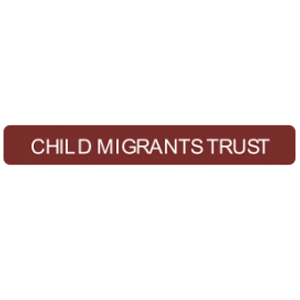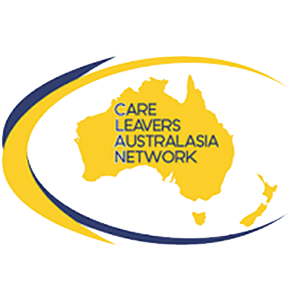In addition to identifying the need for structural transformation to recordkeeping and archiving systems in the medium and long term, discussions at the May 2017 National Summit encompassed what could be achieved through the co-ordination of improvements to existing practices. These ideas have been used to form the foundation of an action and advocacy agenda. This agenda is essential to the development and implementation of the Strategic Plan to transform recordkeeping and archiving practices in Australia. One of its key features is to strive for interconnections between in-care, transitioning and post Care needs. As a chain of responsibility and accountability it can only be as strong as its weakest link.
Action and Advocacy Agenda
Child Centred Recordkeeping
- Develop standard ways in which consent of third parties to share with the ‘subject’ can be expressed as records are created
- Continue to advocate for and support the development and implementation of child-centred recording practices, e.g. using resources such as the Who Am I Induction Kit, identifying best practices for records co-creation, etc.
- Collectively define age appropriate guidelines for access to records (i.e. what a child may be able to see/need/understand at what age) and participation in recordkeeping
- Establish benchmarks for safe and secure child-centred recordkeeping and archiving processes and systems
Transitioning and Young Adult Needs
- Provide records and information about records as part of transitioning out-of-care processes
- Develop briefing material for people moving out of care about their records, and how to access them
- Without removing any right for full access to records, identify key and critical documents to provide a pathway through voluminous case files
- Proactive disclosure – consider establishing a process of showing people their records and/or providing a copy as part of transition, along with explaining safe keepinga nd ongoing access protocols
- Proactive disclosure of access to and ongoing use of childhood records
- Establish support services for access, interpretation and safe keeping of records
- Collectively define age appropriate guidelines about what young adults might be able to see/need/understand
- Establish independent safe keeping places for key documents
Historical Justice
- Immediate priority access to records for older care leavers
- Endorse and implement the Commonwealth Department of Social Services (DSS) Access Principles and Guidelines
- Use administrative discretion to release not to withhold
- Configure FOI/RTI processes and forms around proactive disclosure i.e. the right of people to know what records are held about them
- Full unredacted release of records unless it is clearly unlawful to do so
- Explain and discuss redactions where they must be used
- Lobby Birth, Deaths and Marriage Registrars for a consistent, agreed and national approach for free access to second generations (i.e. me, parents, grandparents) of certificates
- Support for adding to/annotating official records and specifying access controls
- Normalise this existing right to incorporate individual’s stories into the record
- Present the person’s story first
- Enable access wishes to be clearly expressed and honoured, including informed consent for access by researchers
- Continued resourcing for remediation of legacy systems
- Continue advocacy for resources to remediate older systems, particularly name indexing and facilitation of connections to family
- Create clear plans for addressing older records
- Develop guidance for organisations transitioning from current service provider to legacy record holder
- Encourage and support initiatives that enable individuals and communities to tell their stories of ‘care’ experiences and the impacts of institutional systems
Education and Training
- Records release training – work collaboratively to develop guidelines and training on how to release records with minimal redaction (i.e. only where absolutely necessary), including informative disclosure of reasons for redactions, accessible processes for appeal, effective monitoring and oversight to ensure fair and consistent practices and specialised release mechanisms over reliance on generic FOI/RTI processes
- Research ethics – work collaboratively to devise protocols and obligations for researchers in dealing with access to case files and personal information in out of home care research
- Records creation – lobby TAFE, universities and professional standards bodies to pay appropriate attention to writing case notes and other important aspects of recordkeeping in courses
- Recordkeeping systems – increase the knowledge and skills of those involved in delivering child protection and out of home care services, as well as recordkeeping professionals for the development and implementation of child/person safe recordkeeping and archiving processes and systems
- School professional and community education – support for impacted communities to create their own histories, exhibitions, memorials, commemorations, storytelling and other activities etc. to be incorporated into primary, secondary, university and other curricula
